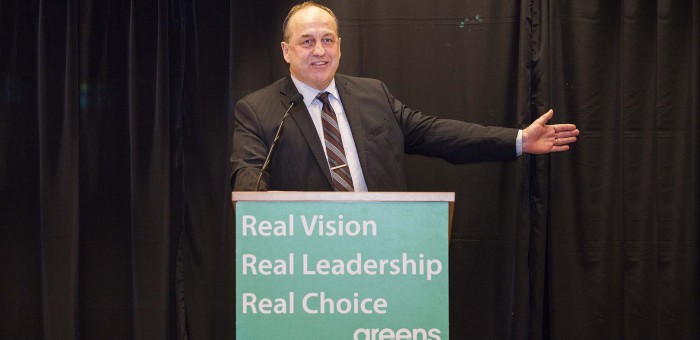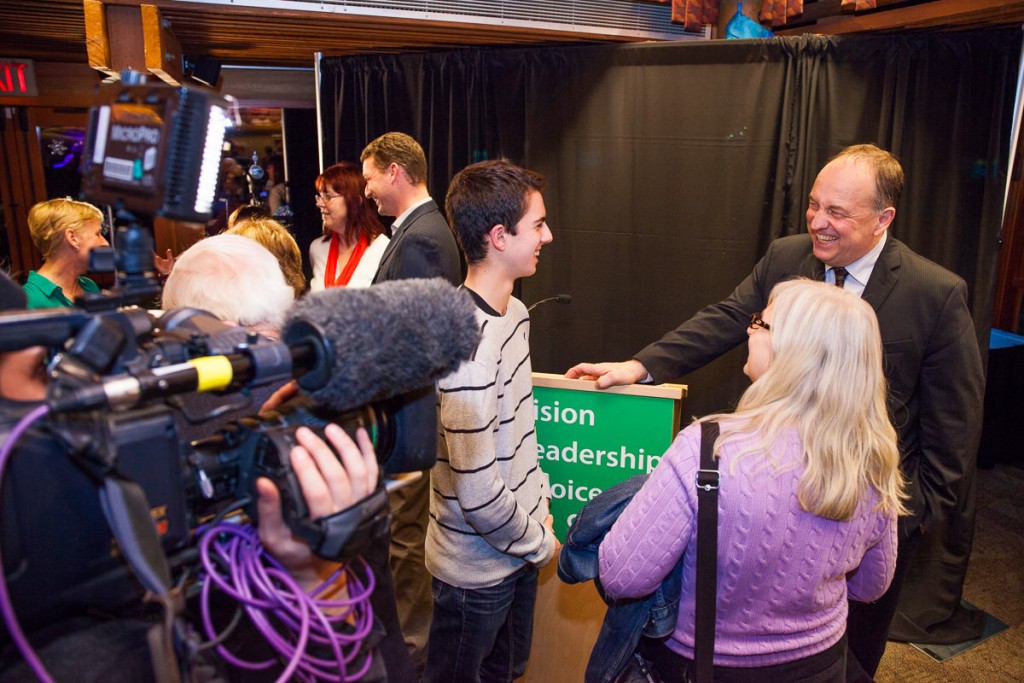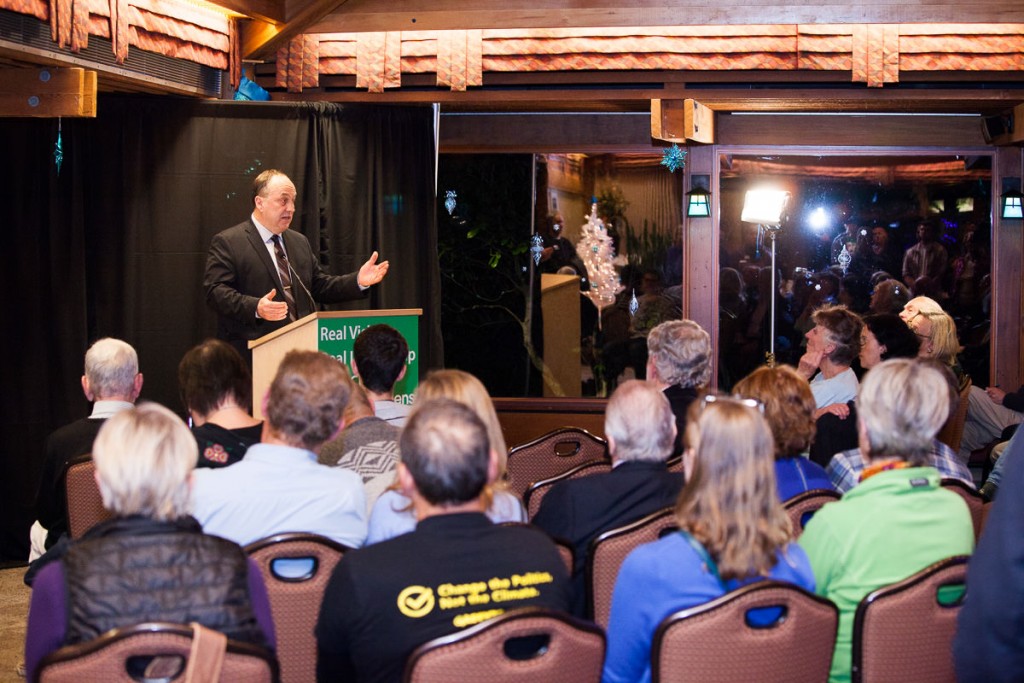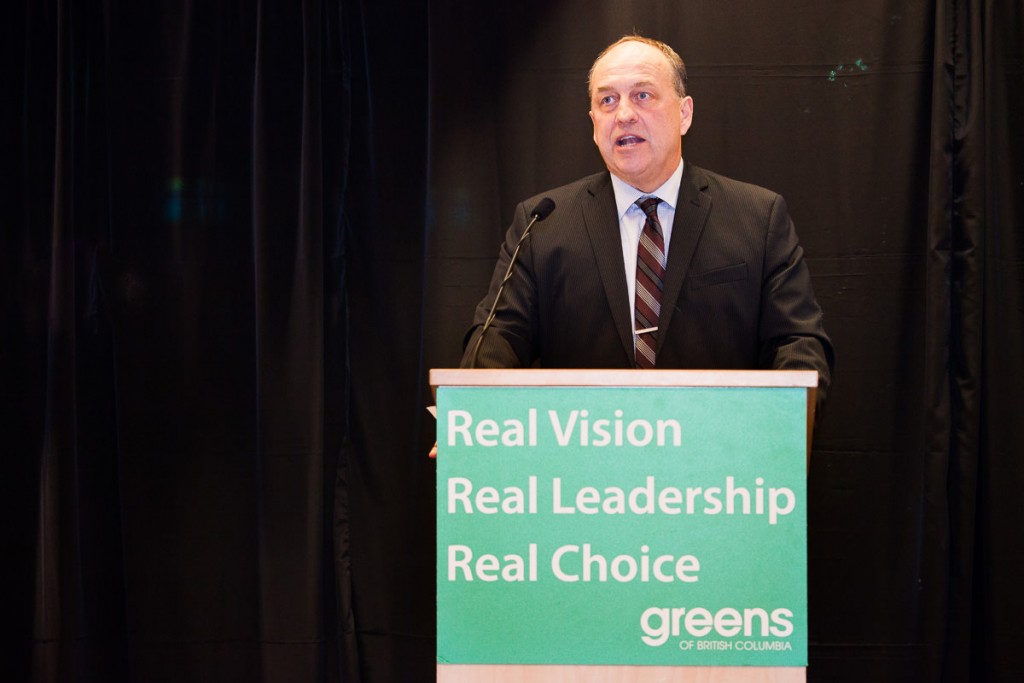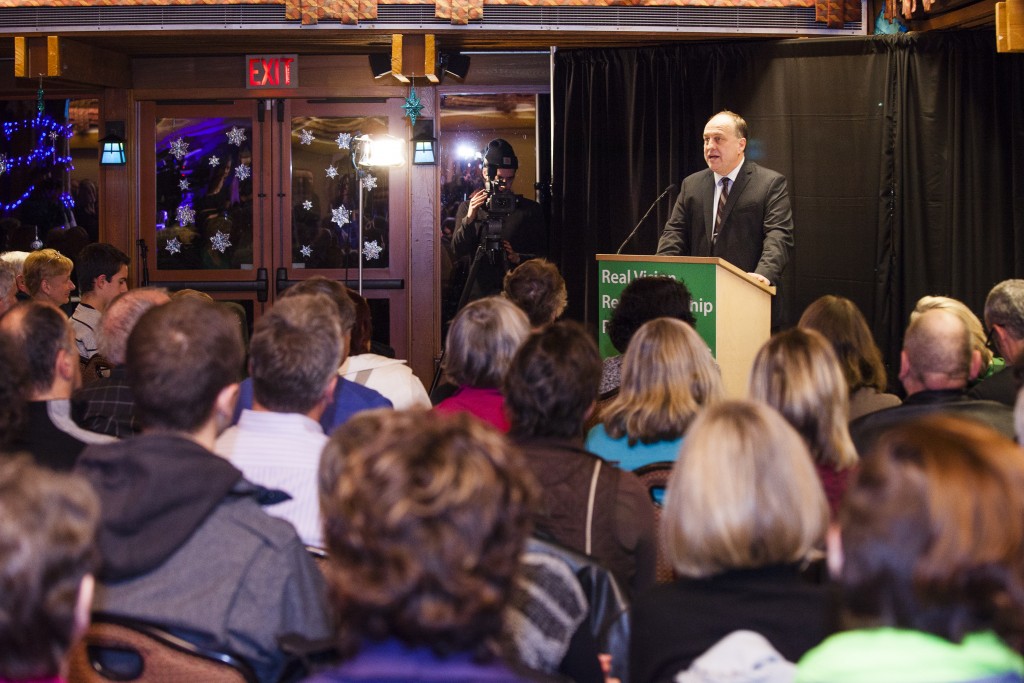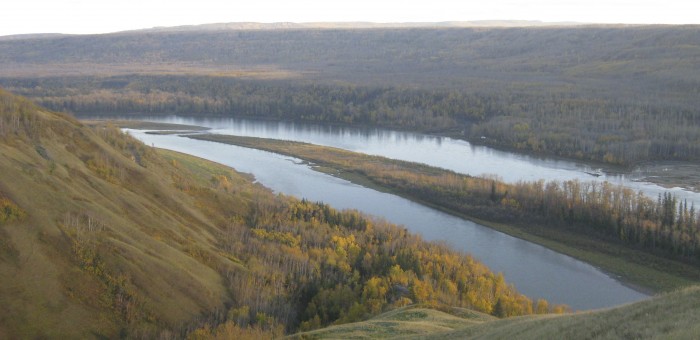BC Hydro
Leadership of the BC Green Party
At the UVic University Club on November 24, 2015 I formally announced my intention to seek the leadership of the BC Green Party. And on December 7, 2015 I was elected by acclamation as our new leader. Below is the text of the speech that I gave at the announcement. In the speech I outlined the reasons why I sought the leadership and I offered a vision for a prosperous future for all British Columbians.
Introduction
Thank you Elizabeth. You’ve been an absolute inspiration to me. And I am honoured that you were able to make it to tonight’s event knowing that you will be heading to the COP21 meeting in Paris imminently.
I’m also very grateful to Claire Martin for coming over from Vancouver to act as our MC. I know that she’s also off to COP21 shortly. And I am especially grateful to Butch Dick from the Songhees nation for welcoming us tonight.
Finally, this event tonight would never have happened if it weren’t for the efforts of the incredible group of individuals that I have the honour of working with: Judy Fainstein, Mat Wright, Evan Pivnick and Karin Lenger along with all of the volunteers. Thank you.
It’s humbling for me to see so many people here. I sincerely appreciate you all joining me this evening and I look forward to answering your questions and chatting with you one on one afterwards.
The University Club in which we stand has a special meaning to me. It first opened in 1967 in the old army hut that stands today as E-Hut. I remember as a little boy being taken by my parents to visit Santa at the annual Christmas parties, including the very first one they hosted. Over the years I’ve had many dinners and attended countless functions in the old E-Hut facility. And in 1982, when Phase II of the University Club was completed — the building we are in now — I had just started my final year of undergraduate studies.
I left Victoria in 1983 and it wasn’t until 1992 that Helen and I returned to our hometown. As a young faculty member I joined the newly created School of Earth and Ocean Sciences, appropriately located in E-Hut, the former location of the University Club. In 1992, if someone would have told me that I would be standing in the University Club as the elected BC Green Party MLA for Oak Bay Gordon Head, I would have thought they were crazy.
I was a scientist. I was a teacher and I had no interest in politics.
Yet two decades later, in the fall of 2012, Jane Sterk, after a number of previous attempts finally convinced me to run in the May 2013 provincial election.
I had spent many years understanding the basic physics of the past, present and future climate system. It became evident that global warming was emerging as the defining challenge of our time, and that there were enormous opportunities available to those jurisdictions that were first to act boldly in transitioning to a low carbon economy.
I advised governments at all levels on available policies that could allow them to seize those opportunities. And I saw British Columbia begin to show leadership by doing just that.
But as the government then shifted all of its efforts, and all of its hopes, to the LNG pipedream, I saw us lose that leadership. I watched as we went from leaders in developing a 21st century economy, to laggards, scurrying back to the 20th century, hoping for an out-dated and unrealistic LNG windfall. For three years now I’ve been saying the same thing. The economics simply does not work for BC to build a thriving LNG industry any time soon.
As I watched our provincial leadership unravel, I was reminded of something I would tell my students. If you want your government to show leadership on the issues that you care about, I would tell them that you need to elect people who will act on your concerns. Or, if you feel like none of the candidates is seriously addressing the issues you are worried about, you should consider running for office yourself.
Ultimately, I decided that I needed to take my own advice. I ran for office because I saw an opportunity to help build a vision that would put our province on a path of developing a 21st century diverse and sustainable economy. Now, after 2 1/2 years in office, it’s clear to me that this is more important than ever.
In the shadows of the massive challenges that we face, our province needs new leadership.
Leadership that offers a realistic and achievable vision grounded in hope and real change.
Leadership that places the interests of the people of British Columbia — not vested union or corporate interests— first and foremost in decision-making. And it’s not only today’s British Columbians that we must think about, it’s also the next generation who are not part of today’s decision-making process.
Leadership that will build our economy on the unique competitive advantages British Columbia possesses, not chase the economy of yesteryear by mirroring the failed strategies of struggling economies.
Leadership that will act boldly and deliberately to transition us to 21st century economy that is diversified and sustainable.
Leadership that doesn’t wait for public opinion — but rather builds it.
It’s clearer to me now than ever before. The province needs new leadership bringing new ideas, new direction and new people to the legislature. For too many decades British Columbia has had to put up with our two-party dichotomy of dysfunction.
On the left there’s the BC NDP. Frankly there’s nothing new or anything particularly democratic about the BC NDP. On the right we have the BC Liberals. And there is absolutely nothing liberal about the BC Liberals.
Too often British Columbians vote for the BC Liberals not because they like what they stand for, but rather because they dislike what the BC NDP stand for. Too often British Columbians vote for the BC NDP not because they like what they stand for, but rather because they dislike what the BC Liberals stand for. And therein lies our opportunity.
The BC Greens will offer British Columbians candidates, ideas and policy that they can vote for, instead of vote against. It’s time for us to create a third viable option.
And so, with the knowledge of the opportunities and challenges that lie ahead, I announce my candidacy for the Leadership of the BC Green Party.
To an Economic Vision for the 21st Century
We have a unique opportunity in British Columbia to be at the cutting edge in the development of a 21st century economy.
Our high quality of life and beautiful natural environment attract some of the best and brightest from around the globe —we are a destination of choice. Our high school students are consistently top ranked — with the OECD specifying BC as one of the smartest academic jurisdictions in the world. And we have incredible potential to a create clean, renewable energy sector to sustain our growing economy. When we speak about developing a 21st century economy — one that is innovative, resilient, diverse, and sustainable — these are unique strengths we should be leveraging.
Unfortunately, instead of investing in a 21st Century economy, our government has banked all its hopes on an irresponsible, unrealistic fossil fuel windfall, with its Liquefied Natural Gas sector. We are already seeing these promises unravel as we chase a falling stock, doubling down on the way.
A 21st century economy is sustainable — environmentally, socially and financially. We should be investing in up-and-coming sectors like the clean tech sector, and creative economy that create well-paying, stable long-term, local jobs and that grow our economy without sacrificing our environment.
We should be using our strategic advantage as a destination of choice to attract industry to BC in highly mobile sectors that have difficulty retaining employees in a competitive marketplace. We should be using our boundless renewable energy resources to attract industry that wants to brand itself as sustainable over its entire business cycle, just like Washington and Oregon have done. We should be setting up seed funding mechanisms to allow the BC-based creative economy sector to leverage venture capital from other jurisdictions to our province. Too often the only leveraging that is done is the shutting down of BC-based offices and opening of offices in the Silicon Valley.
We should fundamentally change the mandate of BC Hydro. BC Hydro should no longer be the builder of new power capacity. Rather, it should be the broker of power deals, transmitter of electricity, and leveller of power load through improving British Columbia power storage capacity. Let industry risk their capital, not taxpayer capital, and let the market respond to demands of cheap power.
Similarly, by steadily increasing emissions pricing, we can send a signal to the market that incentivises innovation and the transition to a low carbon economy. The funding could be transferred to municipalities across the province so that they might have the resources to deal with their aging infrastructure and growing transportation barriers.
By investing in the replacement of aging infrastructure in communities throughout the province we stimulate local economies and create jobs. By moving to this polluter-pays model of revenue generation for municipalities, we reduce the burden on regressive property taxes. Done right, this model would lead to municipalities actually reducing property taxes, thereby benefitting home owners, fixed-income seniors, landlords and their tenants.
Yes, we should be investing in trade skills, as described, for example, under the B.C. jobs plan. But we should also be investing further in education for 21st century industries like biotech, high tech and clean tech. It’s critical that we bring the typically urban-based tech and rural-based resource sectors together. Innovation in technology will lead to more efficient and clever ways of operating in the mining and forestry industries. Just last week, for instance, I was told the story of a BC-based technology innovator partnering with a local mine to dramatically improve the efficiency and environmental footprint of their mining operations. Rather than hauling thousands of unnecessary tonnes of rock to a crusher for processing, the new technology allowed the rocks to be scanned for gold content on site. This meant that prior to trucking, the company could determine if it was more cost-effective to simply put the rock to one side for use as fill later.
Natural gas has an important role to play. But, we should use it to build our domestic market and explore options around using it to power local transport. BC businesses such as Westport Innovations and Vedder Transport have already positioned British Columbia as an innovative global leader in this area.
We should be investing in innovation in the aquaculture industry, like the land-based technologies used by the Namgis First Nation on Vancouver Island who raise Atlantic salmon without compromising wild stocks.
The logging industry is booming yet we send record amounts of unprocessed logs overseas. Now is the time to retool mills to foster a value-added second growth forestry industry.
These are just a few ideas that could help us move to the cutting edge in 21st the century economy.
Fundamental to all of these ideas is the need to ensure that economic opportunities are done in partnership with First Nations. And that means working with First Nations through all stages of resource project development – from conception to completion.
To the issue of Affordability
A 21st century economy must also be an affordable one.
Right now, over half a million British Columbians are currently living in poverty. Today’s report issued by the BC Child and Youth Advocacy coalition noted that one in five children overall in BC live in poverty. More than 50% of children in single-parent families live in poverty. This is unacceptable.
The government responds to these facts with the same old mantra: It can’t do more until the economy grows. Yet, we hear year after year from the government that the economy is growing. The fact is, we have seen growth, we have money to invest, and we know that if we invest capital smartly we will actually save in operating costs. So let me offer just one or two ideas of where we should start:
Let’s fix the Registered Disability Savings Plans and Registered Educational Savings Plans. Currently, RDSPs and RESPs do not receive the same protection that RRSPs and RRIFs do when a family or individual is faced with bankruptcy. This means that when faced with bankruptcy, these already vulnerable individuals lose the one thing that would otherwise provide a glimmer of hope for a financially stable future. By simply providing creditor protection for disabled individuals and children’s education funds we can make the pathway out of poverty that much easier for those individuals experiencing bankruptcy. And let me be clear: This is a policy change—it doesn’t cost anything.
At the same time we know from other jurisdictions, that by providing chronically homeless individuals with a home through Housing First Policies, we not only provide individuals with a basic human right — shelter — but also better health outcomes, all while realizing long-term, overall net savings to government.
Medicine Hat saw a 26% decrease in emergency shelter use in just four years and has housed over 800 people, including over 200 children. Utah has reduced chronic homelessness by 72% as of 2014. A housing first pilot project in Denver, Colorado found emergency related costs and incarceration costs declined by 72.95% and 76% respectively, while emergency shelter costs were reduced by an average of $13,600 per person. Canada’s own At Home/Chez Soi study found that for every $10 invested in housing first services there was an average savings of $21.72.
And we need to deal with rampant speculation in our housing market. Simple steps like closing the Bare Trust Loophole would be effective. Or, as I introduced in a private members bill earlier this year, providing government the means of determining who is purchasing property in B.C. This includes determining both foreign investment flows, the role that corporations are playing in purchasing property and if we have significant speculation coming from other places in Canada.
The solutions to our province’s affordability crisis are out there, and those solutions themselves are affordable. We just need to invest in them. Given everything we know, the question becomes this: how can we afford not to?
To the issue of Health Care
The need for affordability must extend to quality health care too.
We can be proud that B.C. was recently ranked the healthiest province in Canada. This ranking shines a positive light on the healthy lifestyle choices British Columbians make each day. Yet, while we celebrate our successes, we must also remember that our health care system faces serious challenges.
With a highly regressive health care funding system, an aging population, major gaps in primary care, and surgery waitlists lasting anywhere from months to years, it is time for government to take a serious look at how our Health Care System is funded and administered.
British Columbia is the only province in Canada that continues to charge MSP premiums. Such premiums unfairly burden low and fixed income British Columbians with an overly heavy tax burden. With individuals earning a net annual income of $30,000 paying the same monthly flat fee as those earning $3,000,000 per year, it is evident that MSP premiums are perhaps the most regressive form of taxation in B.C.
Instead of charging MSP premiums, we should look at shifting to alternative, more progressive options such as was done in Ontario and Quebec. Rather than flat-rate fees, health premiums can be paid through the personal income tax systems. This avoids the regressive effects of flat-rate premiums and diminishes the additional costs associated with administering the MSP program.
But it can’t stop there. We also need to address the growing gaps in primary care. Doctor shortages and long wait times to get an appointment have led to increased use of walk-in clinics and emergency room services. Unfortunately, this can be costly for both patients and our health system, as a lack of follow-up and co-ordination can mean problems are missed or poorly managed.
Let’s look at investing more in Nurse Practitioners to help close some of these gaps and provide the high quality and timely care that British Columbians pay for and need. Let’s find more effective ways of funding these Nurse Practitioners. Let’s re-examine our approach to the delivery of chronic care services. Relying on acute care services, such as walk-in clinics and hospital emergency rooms, to deal with chronic health issues is both costly and inefficient.
Let’s consider increasing community and at-home care programs, which have been shown to provide better care at a more affordable cost. And let’s lobby the Federal government for our fair share of Canadian Health Transfer revenue, a share that reflects our demographics and the actual cost of delivering health services.
The possibilities for improving our health care system are plenty. As our population continues to age and gaps in primary health care continue to grow, it is more important now than ever to commit to re-examining how we provide affordable, quality health care in B.C.
To the issue of Education
Public education represents perhaps the most important investment government can make for the prosperity of our province. Each and every one of us has attended school and that experience has shaped who we are, what we do and how we contribute to society. And public education is absolutely critical in teaching the next generation of British Columbians to think critically, contribute responsibly to society, and become the leaders of tomorrow.
Given this, why have we not shown more leadership in the Education sector?
At the end of the strike last year, the government spoke about “an historic six-year agreement…which means five years of labour peace ahead of us.”
The implication of this sound bite is NOT that government is stepping up to the task of finding new ways to fund and deliver a leading public education system. The reality is that they are stepping back, allowing their dysfunctional relationship with teachers to simmer, only to boil over again in a few years.
We are stepping back despite an overall 18% and a whopping 44% aboriginal six-year high school non-completion rate. We have school boards at a loss for how to fund their operations due to seemingly endless budget cuts. Surely this is not indicative of a government properly valuing publication education.
It is time for the government to take leadership.
Leadership means ensuring that the resources needed for success are provided. Over the last 13 years, education funding as a percentage of provincial GDP has declined from a high of about 6.4% to an estimated low of about 5.0%. This is not indicative of a government that is prioritizing education. We need to find new, progressive funding sources to reinvest in education.
Leadership means acknowledging that behind the curtain of the BC Public School Employers’ Association is the provincial government. Yet it is the government, not BCPSEA, that draws the lines in the sand on funding. By dismantling the BCSPEA and bringing its operations back into government, a signal could be sent that government is serious in developing a new relationship with teachers.
Leadership also requires a clear eyed assessment of what’s working, and what isn’t – and clearly a ‘one size fits all’ approach isn’t working. The needs on Haida Gwaii, are different from those on Vancouver Island which in turn are different from those in Surrey or Prince George. Now is the time to explore whether or not class size and composition negotiations are better conducted at the school district level instead of the provincial level.
The status quo on education isn’t addressing the growing challenges. We cannot wait until the next labour dispute. Now is the time to sit down with stakeholders and start a dialogue about what a 21st century education system looks like, including how it is funded.
To the issue of Leadership
Our present provincial political leaders seem to have forgotten the essential traits of a successful leader: being principled, honest, authentic, trustworthy and having integrity. Our political leaders must have the courage to be honest with British Columbians about the risks and consequences of any government decision. Honest about the consequences of reckless hyperbole of government promises.
Perhaps the most striking illustration of the lack of honesty in BC’s political discourse has to do with LNG. In the lead-up to the last election, British Columbians were sold a bill of goods by this government. The promise of 100,000 jobs, a $100 billion prosperity fund, a $1 trillion hit to GDP, a debt-free B.C. and on and on.
This government has spent the last three years touting B.C.’s imminent LNG industrial boom. They sent a signal to the market that if industry wanted to do business in B.C., it had better have something to do with LNG. Yet BC’s venture into LNG has been a monumental failure.
The undeniable truth is that British Columbians were sold a bill of goods in that last election that will not come to pass.
Unfortunately it is British Columbians who will bear the consequences of the BC Liberal decisions.
The government’s all in approach on LNG has seen us lose our place of leadership in developing a 21st century economy.
But it’s not too late to reverse this. What we need is a renewed commitment to evidence-based decision making, and a government that is honest with its citizens.
Leadership builds public opinion – it doesn’t follow it. We need politicians who put the good of the province ahead of the good of the party.
This is the type of leadership that is absent from both the BC LIberals and the BC NDP. The BC Liberals will tell you whatever it takes to win. The BC NDP take positions based on what the BC Liberals do, rather than on what the evidence tells us. They try to be all thinks to all people and hence are paralysed by the decision-making process.
One only needs to sit in the legislature for a single debate to see that positions are taken based on the politics of an issue, rather than the evidence behind it.
British Columbians expect more than this. They want to see government acting to help all British Columbians – not merely those who voted – or funded them. This means an honest and open commitment to seek out perspectives and ideas of others and evaluate them based on their merit. Not their source.
To the issue of Choice
There is a choice that we will face in 2017. Another four years of the same old, same old politics as usual that has been working for far too long against the interests of British Columbians, or a new approach to politics that will focus on putting the interests of British Columbians first.
The BC Green Party is the only party that will offer British Columbians a real choice and a real vision for the province. We will offer real leadership with new candidates who run to put British Columbians first and break down the dysfunctional cycle of partisan politics that has dominated British Columbia for far too long.
It will take all of us to bring this vision forward. We have a lot of hard work ahead of us.
But together we will build a prosperous future for all British Columbians.
Thank you everyone for coming tonight and I look forward to your support in the lead up to the 2017 provincial election.
CBC Radio Interview Shortly Before the Event
Moving Forward with Site C Dam Project is Fiscally Foolish
Media Release: September 30, 2015
Andrew Weaver Calls Site C Dam Fiscally Foolish
For Immediate Release
Victoria B.C. – In a debate on the Site C dam in the B.C. Legislature today Andrew Weaver, MLA for Oak Bay – Gordon Head and Deputy Leader of the B.C. Green Party will reject the need for the Site C dam, calling the project ‘fiscally foolish, socially irresponsible and environmentally unsound’.
The debate has been called on a motion brought forward by the Minister of Energy and Mines, The Honourable Bill Bennett, for the House to support the construction of the Site C Clean Energy Project.
In his response to the motion, Andrew Weaver will make seven points arguing alternatives to Site C which will demonstrate clear fiscal, environmental and social benefits for the province.
1: Site C will require the flooding of 16,000 acres of viable agricultural land where alternative energy projects can provide the same power without the footprint;
2: First Nations traditional land use and provincial historical sites would be preserved;
3: Job creation associated with Site C is constrained to one region while alternative energy projects would benefit communities throughout the province, with better long term job prospects;
4: Cost overruns associated to Site C will be borne by provincial taxpayers. Solar, wind and geothermal project risks are covered by industry;
5: Renewable energy projects can be done in partnership with First Nations who would directly benefit through employment and revenue from installed facilities;
6: Site C will take far longer to complete, and is not scalable compared to wind and solar.
7: Renewable energy projects would be located closer to where the energy is required, benefiting regions throughout the province, and reducing energy loss through transmission.
While the Joint Review Panel did not specifically recommend or reject the Site C project, the report highlighted the lack of analysis on renewable alternatives, significant adverse effects on fish, wildlife and wetlands, and unmitigable adverse effects on First Nations traditional land use. In addition, the Canadian Geothermal Energy Association issued a comprehensive report demonstrating the viability of equivalent firm power at a cheaper megawatt rate, and with construction costs of $3.3 billion vs the estimated Site C costs now approaching $9 billion.
“I have been pointing out for several years now that Site C is the wrong project at the wrong time” said Andrew Weaver, “There are clear, viable and cheaper alternatives which the government is deliberately ignoring in order to justify a truly damaging decision. Imagine if we invested $9 billion into the clean technology sector, what a boost that would mean to the economy and employment around the province.”
The full transcript of Andrew Weaver’s speech is attached and will be available at www.andrewjweaver.ca, along with previous statements and analysis on the Site C project.
Media Inquiries
Mat Wright
Press Secretary – Andrew Weaver MLA
Cell: 250 216 3382
Mat.wright@leg.bc.ca
Twitter: @MatVic
Parliament Buildings
Room 027C
Victoria BC V8V 1X4
Why are British Columbians spending so much time in the dark?
The windstorm that pummeled Metro Vancouver on the weekend is a wake up call to everyone in British Columbia that we need to be better prepared to cope with, and communicate about, extreme weather events. These are no longer once in a lifetime or 100 year events. Less than ten years ago the 2006 windstorm heavily damaged Stanley Park and left over 250,000 Hydro customers without power, some for many days. At its peak, this weekend’s storm left over 500,000 in the dark, literally and figuratively, complicated by the fact the BC Hydro website was unavailable, and communications between municipal authorities and emergency services appeared sporadic and uncoordinated. Since Saturday BC Hydro has managed a phenomenal effort in bringing most households and businesses online, and for that the crews often working in extremely difficult conditions must be thanked.
The cost of the storm has yet to be calculated, not only in terms of actual damage to infrastructure, homes and vehicles, but also to lost business. What is obvious though is that communication is essential. The lack of coordinated communication is what leads to the vast majority of messages on social media expressing frustration over lack of information.
This lack of communication and access to information is not new. Think back to last year and what transpired after the Mt. Polley tailings pond breach. It took far too much time for the provincial government to connect with and inform nearby residents. Think back to this past summer’s forest fire season and how it took the government an unseemly amount of time to reassure communities that all resources would be made available. And we can also reflect upon what happened in response to the bunker fuel spill in Vancouver harbour. The ‘after action’ report by John Butler highlighted the lack of coordination and communication between governments and agencies responsible for responding to the spill and informing the public. A pattern emerges.
Residents obviously don’t blame governments and authorities for causing the storm, but they do expect emergency communication systems to be in place to ensure that everyone is kept informed of ongoing developments. They also expect that effective communication systems will be in place to allow people to provide information back to authorities on issues affecting their neighbourhoods.
I am thrilled and heartened to see how so many people in all the areas impacted by power outages, downed trees and damaged homes came to the aid of their neighbours. But once power is fully restored to everyone, and the cleanup gets underway we should look at the lessons to be learned and how we can be better prepared before the next extreme weather event hits. And as the climate system continues to warm, we can expect this to be sooner rather than later.
Probing the “Dereliction of Duty” in Site C Approval
Today in the house I rose in question period to ask the government once more about the economics of the Site C dam project in light of recent revelations. Since elected I’ve continued to point out the economic folly of moving forward with Site C at this time. I’ve expressed concerns on the effect it will have on our credit rating; I’ve pointed out that there are cheaper alternatives like wind or geothermal which would allow supply to keep pace with demand. I’ve also called on the government to broaden BC Hydro’s scope to allow for production of geothermal power.
Earlier this week Emma Gilchrist, Executive Director of DeSmogBlog Canada, authored a two part series on the economic justification for the Site C project. The two articles were based on an extensive interview she had with Harry Swain, former co-chair of the federal-provincial Site C review panel:
- B.C. Government Should Have Deferred Site C Dam Decision, Says Chair of Joint Review Panel
- ‘Dereliction of Duty’: Chair of Site C Panel on B.C.’s Failure to Investigate Alternatives to Mega Dam
Below is the text of my exchange with the Minister of Energy Mines. Our press release is reproduced at the end of this post.
Question
A. Weaver: Earlier this week Harry Swain, co-chair of the joint review panel appointed for the Site C dam and a former Deputy Minister of Industry Canada and Indian and Northern Affairs Canada, raised some very serious concerns about the government’s approach to approving Site C. Mr. Swain was very clear that the government was rushed in approving Site C, and British Columbians will pay for their haste. As Mr. Swain said: “Wisdom would have been waiting for two, three, four years to see whether the projections they” — that’s B.C. Hydro — “were making had any basis in fact.” That’s not exactly a glowing endorsement for the fiscal underpinning of Site C.
The review panel predicted that by building it now, Site C will actually produce more electricity than we’ll need for the first four years, costing taxpayers $800 million. My goodness, we could use that money to build a state-of-the-art sewage system in Victoria.
Mr. Swain is only the most recent person to suggest waiting a few years to see if electricity demand for the project materializes. We could still build Site C down the road if necessary, but we could use the additional time to properly explore cheaper alternatives like our vast geothermal potential in B.C. We have the time. LNG final investment decisions are delayed or not happening at all or somewhere down the yellow brick road or perhaps in never-never land.
My question to the Minister of Energy and Mines is this. Given the massive costs associated with rushing into Site C, will he hit the pause button on construction for two to four years, as recommended by Mr. Swain, and use the time to save British Columbians money and explore viable alternatives?
Answer
Hon. B. Bennett: I will answer the question. I categorically disagree with the premise of the question, but I do have to thank the member for the question. We as government announced this project in December of 2014. It’s certainly one of the largest public infrastructure projects in the province’s history, and it’s an extremely important project to the future of this of province. So I appreciate having the opportunity to stand in the House and talk about it. I’m not sure if I have a critic with the opposition. He hasn’t asked me any questions about Site C to date.
Fair enough questions about the need for the electricity, the cost of the project. These are all legitimate issues that we should be debating in this House.
I’d like to quote from the panel that Mr. Swain chaired. One of the things that Mr. Swain said was that Site C “would be the least expensive of the alternatives, and its cost advantages would increase with passing decades as inflation makes alternatives more costly.” He went on to say, in terms of debt: “The panel concludes that the risk of Site C to the province’s debt management plan is entirely manageable by a prudent B.C. government.” He went on to say: “There is little doubt about the competence of B.C. Hydro to build and operate the project efficiently.” That’s what the panel report stated.
With respect to need, the forecast that Hydro had done, this is what the panel said. The panel said that B.C. Hydro’s forecasting techniques are sound that and B.C. Hydro “has done a responsible job in forecasting.”
Supplementary Question
A. Weaver: Well, we have seen Site C pushed throughout without adequate consideration of the cost effective-effective alternatives. I’d like to quote Harry Swain again. He called this a dereliction of duty. Those are very strong words from a very highly regarded senior official from the Canadian government. To be even more blunt, it’s recklessness on the part of the government. We have a sense of the costs: a $800 million loss in the first four years of operation because of construction timing.
What we need right now is a government that is willing to show leadership on this, willing to put good policy ahead of ideological politics. My question to the minister is this. Will he listen to the call from every member of this side of the House, along with the expert opinion of the joint review panel and countless others, to send the Site C project to the British Columbia Utilities Commission for a proper regulatory review?
Answer
Hon. B. Bennett: Again, I appreciate the question from the member. I actually haven’t heard a peep from anybody on the other side of the House about Site C other than this member, but that’s fine.
They don’t seem to want to talk about economic issues for some reason or other.
B.C. Hydro has been working on this project for the last seven years. They forecasted a demand for electricity that will require the province to have 1,100 megawatts of electricity by 2024. Their forecasting methodology has been tested by the BCUC. That’s the agency that this side of the House loves so much. The BCUC has actually said that B.C. Hydro’s forecasting methodology is state of the art.
B.C. Hydro figures that we’re going to need 1,100 megawatts of electricity in 2024. We set about, over the past two years, to determine what’s the best way to get that 1,100 megawatts of electricity. We looked at absolutely everything, and the decision that we made on this side of the House was to honour the ratepayer. We chose the option that is the fairest, lowest cost to the ratepayer, but that side of the House wants us to do something different.
Media Statement – March 12, 2015
Andrew Weaver Calls for Pause on Site C Dam Development
For Immediate Release
Victoria B.C. – Andrew Weaver, MLA for Oak Bay – Gordon head and Deputy Leader of the B.C. Green Party says its time to hit the pause button on the Site C dam before British Columbians have to foot the $800 million bill for this government’s rushed decision.
Dr. Weaver’s call follows “unprecedented” comments from Harry Swain, chair of the Joint Review Panel that reviewed the Site C Dam proposal. In an interview with DeSmog Blog Canada, Mr. Swain called the government’s failure to properly consider alternatives to the dam a “dereliction of duty”.
“Mr. Swain is a highly respected former public servant. When someone like him raises such serious concerns, we need to listen,” said Andrew Weaver.
Mr. Swain, is a former Deputy Minister of Industry Canada and Indian and Northern Affairs Canada. He is concerned the government was irresponsible in rushing into its decision on Site C and instead should be taking the time to explore alternatives.
According to the panel’s report, by building Site C now the government will end up saturating the electricity market to the point where it will cost B.C. Hydro more to produce electricity than it will get from selling it. The result would cost British Columbians at least $800 million in the first four years of operation.
“The question that needs to be asked is what’s the rush?” said Andrew Weaver. “LNG isn’t materializing along the timeline promised by government. Even if B.C. Hydro’s current projections are true, we still have up to four years before we need to start building the dam. We should use that time to explore alternatives before embarking on the largest infrastructure project in B.C. history.”
Mr. Swain made it clear that alternatives to Site C exist and should have been considered. The panel, however, was not empowered to do so.
“The Minister’s talking points are missing the point.This dam didn’t make sense for BC thirty years ago, and it doesn’t make sense now.”
Andrew Weaver also joined numerous others in calling on the government to send the Site C project to the BCUC for a full, regulatory review.
Media Contact
Mat Wright
Press Secretary – Andrew Weaver MLA
Cell: 250 216 3382
Mat.wright@leg.bc.ca
Site C Decision a Lost Opportunity
Media Statement December 16 2014
Site C Decision a Lost Opportunity
For Immediate Release
Victoria B.C. – Andrew Weaver, MLA for Oak Bay – Gordon Head and Deputy Leader of the B.C. Green Party is extremely disappointed with the announcement by the B.C. Government today to proceed with the construction of the proposed Site C dam.
“The government has engaged in some very creative accounting to make Site C look more competitive than it is,” said Weaver. “They are trying to suggest they have found savings when all they have really done is move the financial costs of this mega project into a different category. The fact is the costs have gone up and so has the burden on taxpayers.”
The updated cost of Site C on ratepayers has been reduced from $83/MWh to $58-$61MWh, with the majority of the change coming from a commitment from government to take less in dividends from BC Hydro. However, this merely shifts the capital costs of building the dam from ratepayers to taxpayers.
Andrew Weaver maintains that Site C is the wrong project at the wrong time. Alternative energy, including geothermal, wind, solar, small-scale hydro sources and biomass, coupled with existing dams would provide firm energy and capacity at a better cost to British Columbians. They would also provide better economic opportunities to local communities and First Nations, with lower impacts on traditional territory.
A recent report by the Canadian Geothermal Energy Association (CanGEA) noted British Columbia has substantial untapped potential for firm, on demand, geothermal power which could be developed as required, in locations close to where power is needed, or near distribution lines.
“I am gravely concerned that government did not compare apples to apples when they examined other alternatives to Site C,” said Weaver. “The rest of the world is taking advantage of the decreasing cost of alternatives such as geothermal, wind and solar technology, while we are effectively subsidizing the construction of another dam.”
“With LNG development not proceeding as promised now is not the time to be borrowing billions for a dam, potentially adversely affecting the provincial credit rating, when geothermal power especially appears far more cost effective. This is lost opportunity to explore alternatives to Site C and I am deeply disappointed in the government’s lack of foresight and leadership.”
Media Contact
Mat Wright – Press Secretary Andrew Weaver MLA
1 250 216 3382
mat.wright@leg.bc.ca

